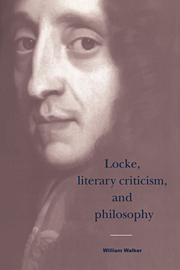Book contents
- Frontmatter
- Contents
- Preface
- Acknowledgements
- Note on the text
- Part I Introduction
- Part II Mind
- 2 Substance, space, labor, and property
- 3 Acquaintance
- 4 Seeing and touching
- 5 Force
- Part III Trope
- Part IV Conclusion
- Appendix
- Select bibliography
- Index
- Cambridge Studies in Eighteenth-Century English Literature and Thought
- Frontmatter
- Contents
- Preface
- Acknowledgements
- Note on the text
- Part I Introduction
- Part II Mind
- 2 Substance, space, labor, and property
- 3 Acquaintance
- 4 Seeing and touching
- 5 Force
- Part III Trope
- Part IV Conclusion
- Appendix
- Select bibliography
- Index
- Cambridge Studies in Eighteenth-Century English Literature and Thought
Summary
LAW I
Every body continues in its state of rest, or of uniform motion in a right line, unless it is compelled to change that state by forces impressed upon it.
Newton, Principia MathematicaIn Book IV of the Essay, there is something so slight yet so overwhelming about seeing as it is evoked as a representation of knowing. What is slight is the exertion that enables it: “if I turn my Eyes at noon towards the Sun, I cannot avoid the Ideas which the Light, or Sun, then produces in me” (632). All Locke has to do in order to see, that is, is to turn his eyes and, of course, open them: “a Man with his Eyes open in the Light, cannot but see” (650). This minimal turn and opening is again referred to on the following page: a man's certainty regarding ideas of God and man and mathematical propositions is as great as his certainty “in a clear Morning that the Sun is risen, if he will but open his Eyes, and turn them that way” (651). At the end of Book IV, Locke again claims that most men “need but turn their Eyes” one way in order to be convinced of some probabilities they are concerned to know (710). Like most men, Locke himself can no more refuse to avoid knowing some things than he “can avoid seeing those objects, which [he] turns [his] Eyes to, and looks on in daylight” (717).
But if these descriptions point to how little Locke and other men have to do in order to see, they also point to something overwhelming in the experience.
- Type
- Chapter
- Information
- Locke, Literary Criticism, and Philosophy , pp. 95 - 128Publisher: Cambridge University PressPrint publication year: 1994

